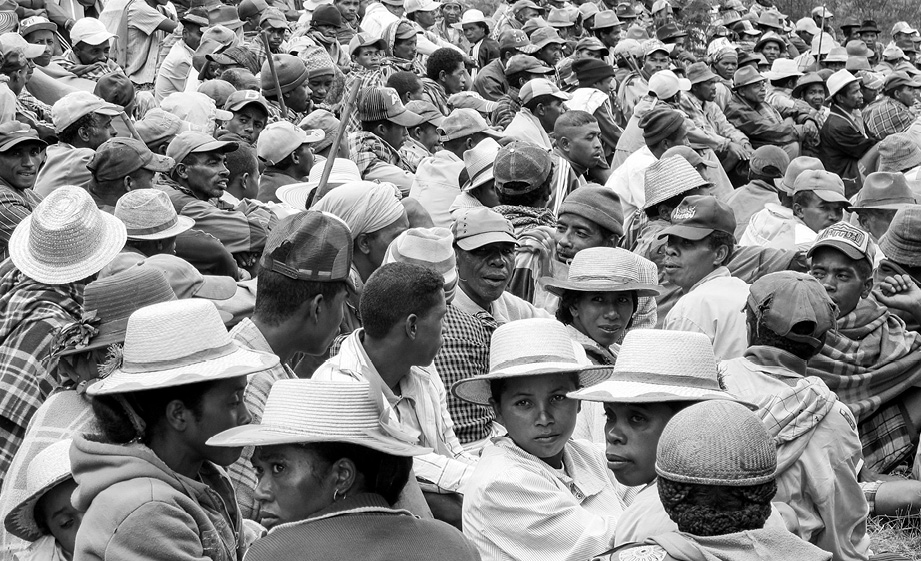Madagascar Solidarity

Stronger together, Fianarantsoa, Madagascar.
Grief can be a lonely, isolating experience. But not in Madagascar, where no one is ever left to remember their loved ones alone.
I discovered this while seeking out Ange, the matriarch of the village where I was staying. Soon I had to abandon my car, because so many were parked on the streets, which were otherwise deserted. Where was everyone? Following the distant, soulful notes of horns, I soon found out. What seemed like the entire village had gathered together, around a tomb set at the top of the hill, by the side of the road. I had stumbled across a rare and very special event.
We were there, I was told, to disinter the bones of the dead and honor the endless cycle of life. This was famadihana (the turning of the bones), a ceremony that takes place every seven years, with its origins in the seventeenth century. It is a burial rite of the Malagasy, where the corpses of ancestors are removed from their crypts to be shrouded afresh. Madagascans believe that until their bones have completely disintegrated, the dead cannot pass peacefully into the next world. So until that time, they are pampered and cosseted more than the living. The tomb of Ange’s ancestors was a concrete construction that looked built to last for all eternity, a far cry from her simple wooden house, which seemed ill suited to survive even a strong gust of wind. I watched as the men of the family carefully lifted shrouded skeletons from the crypt. Friends and family told stories of their adventures and achievements while they were being unwrapped for everyone to see. The bones of the dead were sprayed with expensive perfume and wrapped in costly silk. Then the band increased its tempo and the party began. The men danced with thighs, femurs, and ribs on their shoulders to reaffirm the unseen cord that ties the family together across the generations.
We are used to burial ceremonies where many people gather together for one person; but I had never encountered a collective ritual of this kind, where families were celebrating their ancestors together, in solidarity with each other.
“We all participate in this moment together. My family and my neighbors and my relatives from all over the island. The dead have gone through the door. We are here to share the grief of those left behind,” Ange told me. It would be unthinkable to let a family grieve on its own.
From start to finish, famadihana is an act of community bonding and solidarity that reinforces a village’s resilience to adversity. Families learn from those who have gone before and know that they will in turn teach those who have yet to come. In this they stand shoulder to shoulder with their neighbors offering emotional support in times of need. It comes in many forms—giving money to the family at the time of death, singing together, sharing food, gathering to tell stories, or to repair a house that has fallen down. The solidarity of family life spills over into the village and extends throughout the island.
Such solidarity is much needed in a country that has seen almost continuous political and economic instability since its independence from France in 1960. Having fought for years to obtain independence and seen multiple coups in the decades since, Madagascans rely on solidarity between families and communities to compensate for the lack of stability from government or the economy. Solidarity exists on an everyday basis, and it has come to the fore in moments of crisis, such as when farmers and students protested in unison in 1971, part of the rotaka movement that unseated Madagascar’s first post-independence president, Philibert Tsiranana.
Our willingness to demonstrate solidarity, to stand by people even when the struggle is not our own, is one of the things that make us human: offering love, care, and support for no other reason than it is the right and humane thing to do. Without solidarity we are simply individuals plowing a lonely furrow, vulnerable and exposed. Solidarity is what keeps us safe, enriches our lives, and bonds us together.